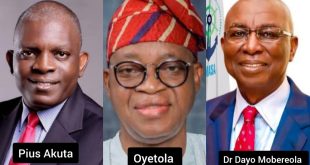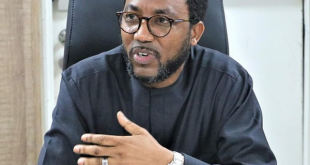By Dr. Eugene Nweke

The Sea Empowerment Research Center wish to note that, at the recently concluded World Economic Forum (WEF), one of the global concerns raised at the forum revolves around the drop in the global trade volumes as witnessed in 2022/2023 period, which the WTO, director general, Dr Okonja Iweala gave performance statistics and proffered options available to the global bodies, to overcome the challenges in this direction and thus boost global trade volumes in the face of the myriads of global challenges impeding on trade volumes amongst nations.

She urged trading Countries to stimulate trade increase volumes via trade policy rebates and waivers, eradicate delays associated with dwell time, increase trade facilitation windows, removal of trade barriers, promote bilateral trade agreements, etc, it was never heard of a systemic and incessant duty exchange rate increments as an alternative window or bar up.
Wherefore, in my Centre’s candid opinion, it think well that, the Coordinating Ministry, should formostly carry out or conduct impact analysis (of the increment from ₦400plus exchange rate for duty onwards to ₦700plus) on trading public and their related activities across the international markets, the manufacturing sectors, and the consuming public.

In the Centre’s opinion, dishing out fiscal and monetary policies without recourse to weighing its economic implications in every sense of responsive leadership via a crystal and statutory feedback mechanism, falls short of the renewed hope mantra.
The Centre believes that, one of the core objects of the renewed hope mantra, should stem from rising from the old order to more requisite new order, especially in application. As such, the Centre equally believes that, the ministry has a duty to know how many business are closing shops per month; how many are down-sizing weekly, monthly and quarterly; what is the population out of job Nigerians; how stable is the labour market under the prevailing circumstances; how has the inflation rate affected the purchasing power of the citizenry; the contributory effect of this policy/increments to the ailing economic hardship and poverty in the land; its contributory effect to the insecurity in the land, etc.
Shying away from undertaking a deliberate review on these critical concerns, to say the least, is tantamount to a mere display of poor administrative sensitivity to the impulse to the well- being of the citizenry and commercial environment of the nation.
It has been argued and still an ongoing argument at different quarters whether the CBN “Duty Exchange Rate Increment” is or not often the determination nor the function of market forces? It was rather reasoned that, at many instances, incessant revenue escalating methodology in this regards is a deliberate act, aka monthly ritual to aide higher or surplus revenue spin and if care is not taken, may snowball into forth nightly application.
Therefore, there is need for the fiscal policy makers to do a total system reevaluation, with a third eyes to specifically monitor some of the deployed regulatory tools, so far. Expectedly, every aspects of our monetary policy tool must be geared to thrive on a level playing field, devoid of preferential treatments or application, so that, the market forces determination will not be a theory but practicality.
The Centre indeed observed the associated trade documentary disruption in the administration of the foreign exchange regime with regards to the International Chamber of Commerce – ICC Rules on Uniforms Customs and Practice ( UCP) for Documentary Credits, that is the general application of the UCP 600, the Form M regulations comes under consideration.
Though, it could be contested that the rules do not have the force of law, but given legal effect by their incorporation into multimodal transport contracts, notwithstanding, where monetary policies tends to ignore its stipulations on the life span of 1 year duration of its Form M transactional applications and treatments on imports, thus, shippers imports landed post Form M opening to meet the new exchange rate, should not be subjected to uniform treatment at the point of import clearance nor subjected to undue queries and associated delays.
There is need for the Coordinating Minister to carry out an independent system study and analysis within the nation’s International trading climate, via an independent body. Such evaluation and recommendations will indeed, aid the ministry to restructure the monetary and fiscal policy formulation.
The effects of these increasingly foreign exchange rate in relation to servicing international loans, and other issues raised here, has to be looked into, because, it is not a mere factor.
It must be stated that, monetary policy reforms must be done with a scalpel and not an axe, and by people who understand that, the problem of currency devaluation or the poor performance of the foreign exchange transactions is not truly caused by international trading or trades alone.
It has been argued that, the cozy relationship and activities of some currency dealers (Bureau De Change) seems to be taking the shape of another form of concentration, even though, inevitable in a country of our size.
Also, while it’s worthy to note that, the activities of money laundering and imports racketeers, by extension drug and arms trafficking( smugglers) have received prompt operational curtailment in the country, notwithstanding, it must be stated that, that their activities have gone more nuclear or sophisticated as it’s now embellished with terroristic organizations.
Fiscal policy makers, have a duty to understudy and discourage the activities of insider trading within the banks at all levels, with special focus on the growing pace of hacking via internet banking. Fiscal policies must be deliberate at encouraging our most enterprising citizens to engage in other, more nationally beneficial money making ventures, for instance, international traders must be encouraged, and not driving them and their capital and associated job creations out of the country, via over- taxation.
Fiscal policies must have the capacity to monitor and checkmate the activities of an investor who turns monopolistic with cozy relationships with insider trading, thus oligarchy thrives unabated, as they have mastered the ability to borrow huge sums of money for acquisitions, then manipulate accounting principles, play legal takeover games or avoid payments of accurate taxes, in reality such investors do not really contribute to the nation’s wealth.
As a responsive government, it is expected that, fiscal policies must be structured in a such a manner that, it places emphasis on revamping its fiscal implementation regime so that, it must seek to protect the larger number from acts of bullying and abuses associated with cozy relationships, resulting to failure and compromises on regulatory standards.
The fact of the matter is that, the benefits, opportunities and strength of a nation’s fiscal policy cannot be bought out or reduced by the overtures of monetary policy aimed at regulatory obligations but cushioned by the fiscal policy, anything to the contrary, is nothing “other than serfdom, working for the lord of the manor or Becker’s owned by the lord”.
From study conducted amongst the trading public, in the manufacturing sector and trading sector, every organization is cutting down costs and readjusting overhead costs, but in the real sense of economic adjustment, it is not so with the National Assembly, the Judiciary and the Executive as evidenced in their 2024 respective budgets, characterized by vehicles and furniture acquisitions, when the ones at hand are not totally in a bad state, but can be maintained accordingly. The Nation will recover and do better by cutting costs of governance.
Experiences gained from other countries, have shown that, no country successfully sustains its economic development and viability on a premise where its banking system simply means “big guys gets bigger and the little guys wait to get taken over by the big guys, where monopolies, certain individuals having enormous financial powers to even dictate the apex banks a challenge.
Fiscal policy must not be seen to be overtaxing trade, especially trade amongst other countrie, rather in a distressed economy, like ours, fiscal policies consider tax options on wealth/luxury ( such as estate, gift taxes or annual wealth taxes), while being mindful of the activities of a handful fiefdom and dynasties known as “economic aristocracies”.
It is no longer hidden or overstatement noting that, the present state or spate at which our foreign exchange regime stands, is the over doze or ripple effects of “monopoly game gone wild and players have snapped up just about all the squares”, the making of previous government.
In conclusion, there will be need to explore the in roles of professionally research and development in this regards. Most often formulation of fiscal policies for trade related needs and leaving out the fiscal policy to drive the Freight logistics chains breeds limitations to the overall performance of our national trade volumes.
In specific terms, tax exemptions on logistics services equipment acquisition and importation – policies implementation should be redefined. Under a deliberate national discriminatory policy, Tax law should provide for a dividends free tax when paid by Nigerians to Nigeria corporations and an imposition of 10% on dividends when paid by foreign investments or foreign investors.
Against the backdrop of the overwhelming consequences of this increment, We wish to sign off, by requesting the Coordinating Minister, to direct the CBN to desist from this act of incessant increment of exchange rate for customs duty assessment forth with, doing so, for the interest of over stretched and suffering Nigerians populace, in the spirit of the renewed hope mantra.
This is our Centre’s position and right of expressions on the incessant increments on the exchange rate for customs duty administration.
Fwdr Dr Eugene Nweke Rff Fnis Ksm
Head Of Research, @ Sea Empowerment Research Center
 MMS PLUS NG – Maritime, Aviation, Business, Oil and Gas News Online Newspaper with coverage in Maritime, Oil and Gas, Aviation, Power and Energy as well as Financial News
MMS PLUS NG – Maritime, Aviation, Business, Oil and Gas News Online Newspaper with coverage in Maritime, Oil and Gas, Aviation, Power and Energy as well as Financial News









